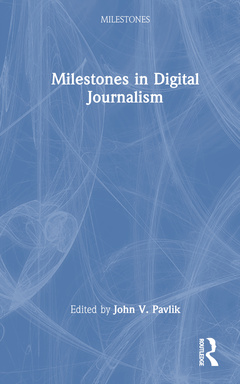Description
Milestones in Digital Journalism
Milestones Series
Coordinator: Pavlik John V.
Language: English
Subject for Milestones in Digital Journalism:
· 13.8x21.6 cm · Hardback
Description
/li>Contents
/li>Readership
/li>Biography
/li>
Milestones in Digital Journalism sets out ten defining moments that changed the way we understand, produce, finance and engage with the news today.
Designed for weekly use on digital journalism courses, these ten milestones provide a conceptual roadmap to understanding the subject while drawing on case study examples which help students home in on key markers in its history. Each milestone is selected for its impact on the nature of journalism practice, the content of journalism, the structure of the journalism industry and/or public engagement in the news. Milestones are defined as the key markers in the development of digital journalism worldwide since the 1970s. The featured markers are diverse and global, ranging from the first virtual reality (VR) screening of Nonny de la Peña?s Hunger in Los Angeles at Sundance Film Festival, to citizen reporting of the police killing of George Floyd in 2020. Written by experts in each of the areas chosen, this book offers an inclusive and de-centred overview of the field and an ideal springboard for further study.
Milestones are a range of accessible textbooks, breaking down the need-to-know moments in the social, cultural, political and artistic development of foundational subject areas.
This book is key reading for students learning about the history of digital journalism worldwide.
Introduction
John V. Pavlik, Rutgers, the State University of New Jersey
Chapter 1. Stealing the newspaper: How the web changed everything for news
Robin Ewing, Hong Kong Baptist University
Chapter 2: Data journalism: The emergence of computational journalism at Georgia Tech, 2006–2008
Nicholas Diakopolous, Northwestern University
Chapter 3. Interactivity, multimedia, and animation in news storytelling: The New York Times’ “Snowfall,” Swedish SvD’s “Räntekartan,” and Brazilian Aos Fatos' “Fátima”
Ester Appelgren, Södertörn University
Chapter 4. Social media, citizen reporting, and journalism: Police killing of George Floyd, 2020
Allissa V. Richardson, University of Southern California
Chapter 5. The (mobile) news ecosystem milestone
Carl-Gustav Linden, University of Bergen, Mikko Villi, University of Jyväskylä, and Oscar Westlund, Oslo Metropolitan University and University of Gothenburg
Chapter 6. Casting out empire: Dipsaus and the challenge and promise of Black independent podcasting in the Netherlands
Chenjerai Kumanyika, New York University
Chapter 7. Immersive journalism: Beyond the rectangle with Nonny de la Peña’s Hunger in Los Angeles, 2012
Dan Pacheco, Syracuse University
Chapter 8. Drones, satellites and journalism: Telecopter launches aerial journalism, 1958
Kearston L. Wesner, Quinnipiac University
Chapter 9. Algorithms and journalism: A case study of an AI-driven news ranking and recommendation system
Donghee Shin, Chung-Ang University, South Korea
Chapter 10. AI, digital strategy and emerging revenue models for news: The Wall St. Journal’s smart paywall, 2018
Jeremy Gilbert, Northwestern University
Reading List
Glossary
Timeline
Index
John V. Pavlik is Professor of Journalism and Media Studies at Rutgers, The State University of New Jersey, USA.




